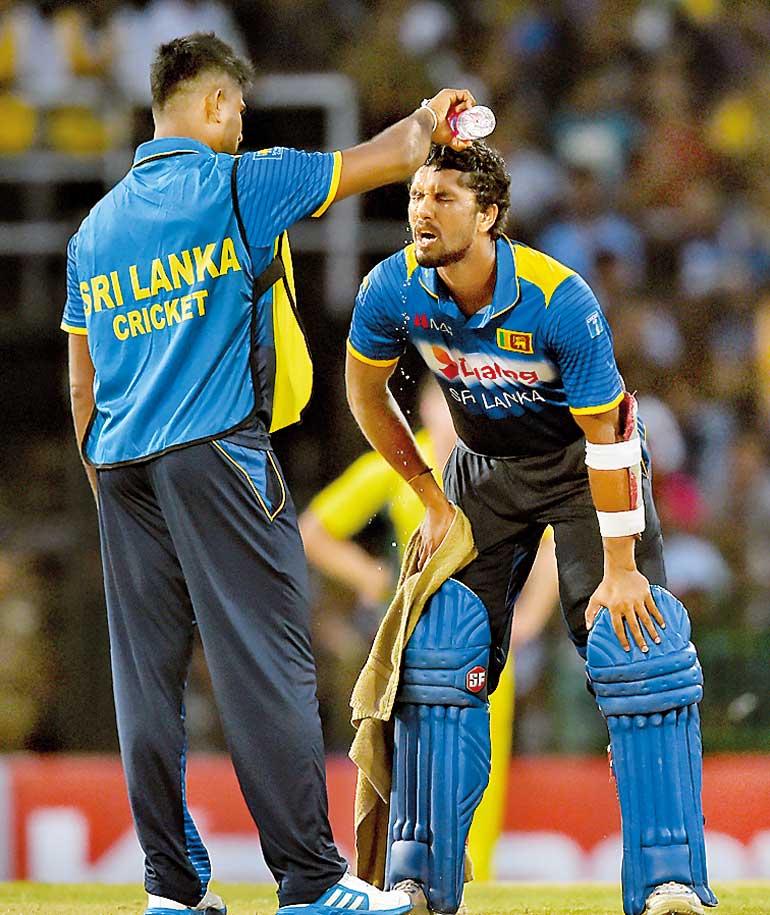Monday Feb 16, 2026
Monday Feb 16, 2026
Tuesday, 23 August 2016 00:16 - - {{hitsCtrl.values.hits}}
ESPNCricinfo: The dismissal of three batsmen between the 30th and 33rd overs turned the course of the match and was a major cause of Sri Lanka’s three-wicket defeat to Australia in the first ODI according to Sri Lanka captain Angelo Mathews.
Mathews himself had lost his wicket in that period, miscuing a James Faulkner ball to backward point, where he was brilliantly caught. His wicket was the second in a double-wicket maiden, and Mitchell Starc would soon strike to dismiss Dhananjaya de Silva as well. Having been 124 for 2, Sri Lanka slipped to 132 for 5, and the innings never really recovered.
“We were going pretty well at one point,” Mathews said. “But straight after Kusal Mendis got out, I got out, and then Dhananjaya got out. I thought that was a bit of a turning point. We needed a partnership with Dinesh Chandimal. Either me or Dhananjaya had to set it up for Thisara Perera and Milinda Siriwardana to go out there in the 43rd or 44th over and get those quick runs. It wasn’t easy to get quick runs. The boundaries were 80 or 85 yards away. We needed to be scrappy, but unfortunately we were short 20 or 30 runs.”
The dry state of pitches has been a cause of mild controversy so far in this Australia tour, and the Khettarama surface for this match was criticised – both by Aaron Finch, who labeled it a “poor pitch”, but also by Mathews, who delivered a milder censure. Balls were seen to disturb the surface early in the match, and virtually every ball was raising dust by the finish. It was Australia’s seamers, who through a variety of slower balls, used the conditions better on this occasion.
 Sri Lankan cricketer Dinesh Chandima (R) looks on during the first One Day International (ODI) cricket match between Sri Lanka and Australia at the R Premadasa International Cricket Stadium in Colombo on 21 August. – AFP
Sri Lankan cricketer Dinesh Chandima (R) looks on during the first One Day International (ODI) cricket match between Sri Lanka and Australia at the R Premadasa International Cricket Stadium in Colombo on 21 August. – AFP
“The pitch was a bit too dry I thought,” Mathews said. “It was hard work for the batters. It was stopping and gripping for the seamers’ slower ones, and it was turning square. With this kind of weather we knew it was going to turn, but it was a bit too dry. It’s that type of wicket that Australia’s seamers will also come into play with their variations.”
Among those extracting dramatic turn from the surface was debutant left-arm spinner Amila Aponso, who spun several deliveries so sharply it wound up in the hands of Mathews at slip. He consistently threatened the outside edge of Australia’s right-handers, and finished with figures of 1 for 27 from his 10 overs. He was by a distance the most economical Sri Lanka bowler.
“I thought Amila bowled the best out of the lot,” said Mathews, who used five slow bowlers in the match. “Dilruwan Perera was steady, but the way Amila bowled was fantastic. This is actually the first time I’m seeing him. He bowled extremely well and I’m very pleased.”
Mathews said Aaron Finch, who hit seven fours and two sixes to make 56 from 46 balls, had set up the chase for Australia.
“He got a lot of runs against the new ball, and that would have been his plan, because when the ball gets a bit older – after 10 overs – it is not easy on this track. With the fielding restrictions and two men out of the ring, he scored quickly and fearlessly against our spinners.”